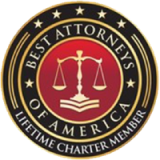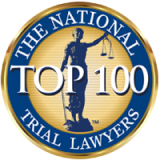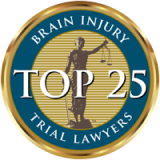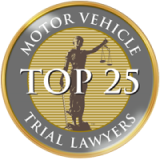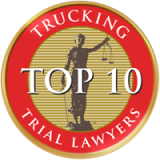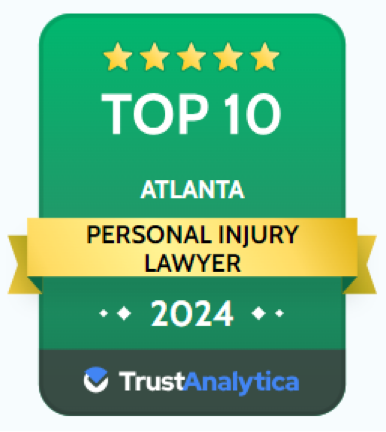All information provided about the law is very general in nature and should not be relied upon as legal advice. Every situation is different and should be analyzed by a lawyer who can provide individualized advice based on the facts involved in your unique situation, and a consideration of all of the nuances of the statutes and case law that apply at the time.
Who is at Fault in a 4-Way Stop Accident?
You’ve driven through the same 4-way stop a million times. This time, when it’s your turn to go, you suddenly lose control and crash into another vehicle. You’re dazed and confused, trying to figure out what happened. As you start to regain your bearings, you realize what’s gone on. Another driver flew through their stop sign and collided with you.
What is a 4-Way Accident?
A four-way stop intersection is a road junction where all four directions of traffic are controlled by stop signs. Georgia’s 4-way stop rules require that all drivers must come to a complete stop, and yield to vehicles that are already waiting to go. A 4-way stop accident is caused when one or more fail to do so.
This type of accident can quickly become complex, especially when more vehicles are involved. For example, confusion can arise when multiple cars arrive at the intersection simultaneously. If the accident occurs in a less busy area, it may indicate a lack of traffic cameras or witnesses, which could help clarify the question of fault. Drivers often point fingers at one another instead of accepting responsibility, and depending on the severity of the accident, injuries can be serious. For all of these reasons, you must document the scene and take these attorney-recommended steps to the best of your ability.
Georgia’s 4-Way Stop Rules
While intersections are essential for travel, they also create conditions that can increase the risk of accidents. Each year, about a quarter of traffic fatalities and half of injuries happen at intersections. In 2022, there were 42,514 total traffic-related deaths. Of these, 7,832 involved an unsignalized intersection (e.g., stop sign-controlled, yield sign-controlled, or uncontrolled). A four-way stop is considered an unsignalized intersection.
Georgia’s 4-way stop rules are:
- Each vehicle must come to a complete stop and wait until it has the right of way.
- The first vehicle to arrive is the first to go.
- Drivers must check for other cars, cyclists, pedestrians, and scooters.
- Vehicles should only proceed through the intersection when it is safe to do so.
- When vehicles arrive at the same time, the car on the right goes first.
- Those turning left yield to oncoming traffic.
Even if you have the right-of-way at a 4-way stop, you should still be very cautious when approaching an intersection. Just because you’re paying attention and following the rules of the road doesn’t mean everyone else is. If you see something that seems likely to cause an accident, slow down and do your best to avoid a collision.
Importance of Knowing Right-of-Way
Who has the right-of-way at a four-way stop, and why is knowing this important? Intersections are among the most common locations for accidents, so you absolutely need to understand who goes first. Most crashes occur when at least one driver misinterprets or completely ignores the rules of the road. Whether you’re new to driving or experienced, knowing who has the right-of-way at a 4-way stop is not just essential, it’s empowering and can help keep roads safe.
The Future of Four-Way Stops
Over the past several years, the State of Georgia has started replacing 4-way stop intersections with roundabouts, because they have been found to reduce traffic accidents. A study from the Federal Highway Administration found that implementing roundabouts results in an 82% reduction in conflicts, crashes, and injuries. Similarly, a study from the Institute for Highway Safety has shown that roundabouts lower crash rates by 35–47% and injury crashes by 72–80%.
Determining Fault
We’ve already established that 4-way intersections can be dangerous. If you’ve been involved in an accident there, figuring out who is at fault is essential. Who has the right-of-way at a four-way stop? Determining this will have a significant impact on deciding who is at fault. Investigators assigned by Montlick will look into who arrived at which stop sign first, where they were headed, and whether a traffic violation was committed. Violations include:
- Failure to stop
- Speeding
- Failing to yield the right-of-way
In 4-way stop crashes, fault can be difficult to sort out unless strong evidence indicates one or more parties were clearly in the wrong. Evidence that can prove you were NOT at fault includes credible witness statements, dash cam footage, and proof of where your vehicle was damaged. If, after the investigation, you’re found to be partially responsible, Georgia’s comparative negligence rule may still allow you to recover damages. However, keep in mind that the amount you receive will be reduced by your percentage of responsibility — if you were 25% responsible, the total amount owed to you will be decreased by that same percentage.
What to Do after an Accident
The minutes, hours, and days following a 4-way intersection accident are crucial. To ensure your rights are upheld, follow a few simple steps:
- Ensure everyone’s safety and call 911. First, check that all passengers in the vehicle are okay. Then, look around for other cars or pedestrians that might have been involved. Once you’ve moved to a safe distance from the accident, call emergency responders; in most states, you’re required to notify the police after any vehicle collision.
-
- Exchange information. Share contact details with the other involved parties, including full names, addresses, insurance companies, phone numbers, email addresses, and vehicle information. Try to get a photo of the other driver’s auto insurance card.
- Document the scene. Take multiple photos of your injuries, all involved vehicles, the surrounding area, and any other relevant details. We recommend noting details on your phone about the scene, including each car (year, make, model, and color), distinctive features, the exact location of the collision (including street names and the lane where the crash occurred), and how the accident happened.
- Seek medical attention. After documenting the scene, consult a healthcare professional. Even if you feel fine, some injuries might not show symptoms right away. Your health is our top priority, and seeing a doctor helps protect your well-being and can support your legal case. Medical records and documented injuries are essential for proving your claim.
- Call Montlick. Once you have been initially checked out by a medical professional and released, call Montlick. We’ll do a thorough attorney-led intake and begin investigating your claim to help determine who was at-fault and what your options are moving forward.. Your road to fair compensation begins now.
Montlick. Because You Deserve Top-Representation.
Four-way intersection accidents can be intimidating and leave you feeling shaken. Afterwards, it can be difficult figuring out what you should do next. Montlick’s team of highly skilled legal minds is ready to offer you a guiding hand.
For over 40 years, we have dedicated ourselves to protecting our clients and their well-being. From the initial consultation through investigation, settlement negotiations, and potential courtroom appearances, we will show what compassionate and comprehensive representation truly means. We promise to stand firm in every fight, on your behalf.
If you were involved in an intersection accident caused by another driver’s recklessness, you need legal representation. But not just any lawyer will do. You deserve an attorney who is part of the most experienced team around: Montlick. A 4-way intersection accident doesn’t have to haunt you financially forever. Our attorneys will fight to get you the compensation you deserve.
Contact Montlick today or call us 24 hours a day/7 days a week at 1-800-LAW-NEED® or 1-866-545-1592 for your free consultation with an attorney.
How useful is this for you?
Would you like to speak with an attorney?
Call NowWe Win More than Settlements.
We win the peace-of-mind you need to get your life back.
At Montlick, we believe comprehensive legal representation is a right, not a privilege. That’s why we provide our services on a contingency fee basis. You only pay when we win.


